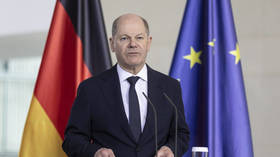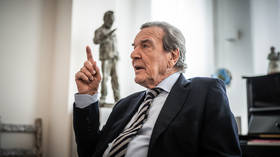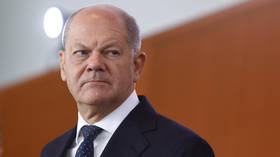German leader sets conditions for talks with Putin

Negotiations between Germany and Russia are possible but only after Moscow gives up on its goals in the Ukraine conflict, Chancellor Olaf Scholz said on Saturday. The German leader told the newspaper TAZ that he would only talk with President Vladimir Putin if Russia “abandoned” its campaign.
When Russia started its military operation against Kiev in February 2022, it cited the need to protect the people of Donbass, eradicate Nazi ideology in Ukraine, and prevent Ukraine from joining NATO.
On Saturday, Scholz reiterated his pledge to “support Ukraine for as long as it is necessary.” When asked about when he thinks the conflict could end, the chancellor replied that “nobody can answer this question.”
When further pressed on whether the West should “push harder for negotiations and compromise,” the chancellor hit back by saying that “Russia must not win this war.” Asked by TAZ when the last time he talked to Putin was, Scholz said it was in December 2022.
The interviewer noted that “many people, particularly in eastern Germany” would like to see an agreement with Russia and asked why Scholz had not tried talking to the Russian president since late 2022.
“Such conversations are useful when you feel like you can make a difference,” Scholz replied, adding that he would do so “when the time comes.” When asked to provide more details about a potential time frame for negotiations, the chancellor said that any talks could take place only after “Russia realizes that there will be no dictated peace” and “Putin understands that he has to abandon his campaign and withdraw troops.”
In March, Kremlin Spokesman Dmitry Peskov told the newspaper Argumenti i Fakty that Moscow has new regions that need to be protected against encroachments by Kiev and that it cannot allow a state on its borders that has a stated aim of seizing Crimea and the new territories, he said, referring to the Donetsk and Lugansk People’s Republics and Zaporozhye and Kherson regions.
Moscow has never stated that it planned to seize all of Ukraine but has explained that it sought to ensure that the Ukrainian military could not pose a threat to Russian citizens or territory. Russian officials have also repeatedly expressed a willingness to engage in peace talks at any time as long as the reality on the ground was taken into account.
Kiev has repeatedly insisted that it would only consider any peace talks with Moscow after Russia withdraws its troops from all territories that Ukraine claims as its own. The Kremlin has brushed those demands off as absurd.
On Saturday, Scholz also said that many Germans were afraid of a potential escalation and called such fears “understandable.” But Berlin still would not abandon its support for Kiev, he said, adding that Germany “cannot accept” Russia prevailing on the battlefield.















